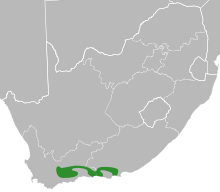
Tea is an aromatic beverage prepared by pouring hot or boiling water over cured or fresh leaves of Camellia sinensis, an evergreen shrub native to East Asia which probably originated in the borderlands of southwestern China and northern Myanmar. Tea is also rarely made from the leaves of Camellia taliensis. After plain water, tea is the most widely consumed drink in the world. There are many different types of tea; some have a cooling, slightly bitter, and astringent flavour, while others have vastly different profiles that include sweet, nutty, floral, or grassy notes. Tea has a stimulating effect in humans primarily due to its caffeine content.
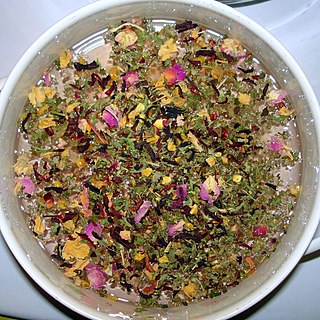
Herbal teas, also known as herbal infusions and less commonly called tisanes, are beverages made from the infusion or decoction of herbs, spices, or other plant material in hot water. Oftentimes herb tea, or the plain term tea, is used as a reference to all sorts of herbal teas. Many herbs are used in herbal medicine. Some herbal blends contain actual tea.

Rooibos, or Aspalathus linearis, is a broom-like member of the plant family Fabaceae that grows in South Africa's fynbos biome.

Fynbos is a small belt of natural shrubland or heathland vegetation located in the Western Cape and Eastern Cape provinces of South Africa. This area is predominantly coastal and mountainous, with a Mediterranean climate and rainy winters. The fynbos ecoregion is within the Mediterranean forests, woodlands, and scrub biome. In fields related to biogeography, fynbos is known for its exceptional degree of biodiversity and endemism, consisting of about 80% species of the Cape floral kingdom, where nearly 6,000 of them are endemic. This land continues to face severe human-caused threats, but due to the many economic uses of the fynbos, conservation efforts are being made to help restore it.
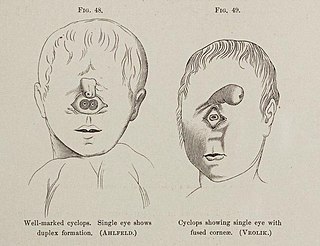
Cyclopia is the most extreme form of holoprosencephaly and is a congenital disorder characterized by the failure of the embryonic prosencephalon to properly divide the orbits of the eye into two cavities. Its incidence is 1 in 16,000 in born animals and 1 in 200 in miscarried fetuses.

Camellia sinensis is a species of evergreen shrub or small tree in the flowering plant family Theaceae. Its leaves and leaf buds are used to produce the popular beverage, tea. Common names include tea plant, tea shrub, and tea tree.

Assam tea is a black tea named after the region of its production, Assam, India. It is manufactured specifically from the plant Camellia sinensis var. assamica (Masters). The Assam tea plant is indigenous to Assam—initial efforts to plant the Chinese varieties in Assam soil did not succeed. Assam tea is now mostly grown at or near sea level and is known for its body, briskness, malty flavour, and strong, bright colour. Assam teas, or blends containing Assam tea, are often sold as "breakfast" teas. For instance, Irish breakfast tea, a maltier and stronger breakfast tea, consists of small-sized Assam tea leaves.

Darjeeling tea is a tea made from Camellia sinensis var. sinensis that is grown and processed in Darjeeling or Kalimpong Districts in West Bengal, India. Since 2004, the term Darjeeling tea has been a registered geographical indication referring to products produced on certain estates within Darjeeling and Kalimpong. The tea leaves are processed as black tea, though some estates have expanded their product offerings to include leaves suitable for making green, white and oolong teas.

Otocephaly, also known as agnathia–otocephaly complex, is a very rare and lethal cephalic disorder characterized by the absence of the mandible (agnathia), with the ears fused together just below the chin (synotia). It is caused by a disruption to the development of the first branchial arch. It occurs in every 1 in 70,000 embryos.

Jervine is a steroidal alkaloid with molecular formula C27H39NO3 which is derived from the plant genus Veratrum. Similar to cyclopamine, which also occurs in the genus Veratrum, it is a teratogen implicated in birth defects when consumed by animals during a certain period of their gestation.

Matcha is finely ground powder of specially grown and processed green tea leaves, traditionally consumed in East Asia. The green tea plants used for matcha are shade-grown for three to four weeks before harvest; the stems and veins are removed during processing. During shaded growth, the plant Camellia sinensis produces more theanine and caffeine. The powdered form of matcha is consumed differently from tea leaves or tea bags, as it is suspended in a liquid, typically water or milk.

Aspalathus is a genus of flowering plants in the family Fabaceae. The yellow flowers and spiny habit of some species have suggested a resemblance to Ulex europaeus, the thorny "English gorse" Accordingly, "Cape Gorse" has been proposed as a common name although the resemblance is largely superficial; for instance, gorse is thorny, whereas Aspalathus species are variously spiny or unarmed. The genus belongs to the subfamily Faboideae. There are over 270 species, mainly endemic to southwestern fynbos regions in South Africa, with over fifty occurring on the Cape Peninsula alone. The species Aspalathus linearis is commercially important, being farmed as the source of Rooibos tea.
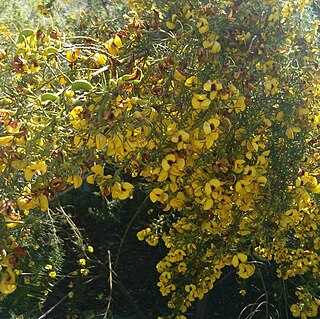
Cyclopia, the honeybush, or heuningbos in Afrikaans, is a genus of some 20 species of flowering plants in the legume family Fabaceae, subfamily Faboideae. Its description was published by the French botanist Étienne Pierre Ventenat in 1808. The name Ibbetsonia, published two years later, is regarded as a synonym of this genus; John Sims had commemorated the physiologist Agnes Ibbetson with this name.
C. intermedia may refer to:
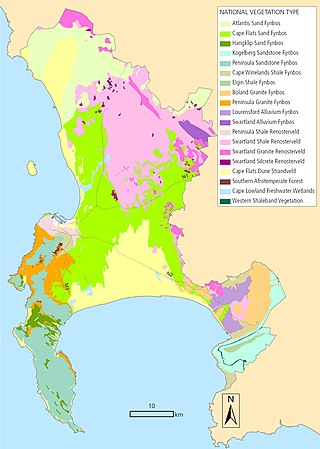
The Biodiversity of Cape Town is the variety and variability of life within the geographical extent of the City of Cape Town metropolitan municipality, excluding the Prince Edward Islands. The terrestrial vegetation is particularly diverse and much of it is endemic to the city and its vicinity. Terrestrial and freshwater animal life is heavily impacted by urban development and habitat degradation. Marine life of the waters immediately adjacent to the city along the Cape Peninsula and in False Bay is also diverse, and while also impacted by human activity, the habitats are relatively intact.

Numi Organic Tea is a privately owned triple bottom line social enterprise based in Oakland, California. Numi is known for its assortment of organic and fair trade certified teas and herbal "teasans". The company was founded in 1999 by brother and sister, Ahmed Rahim and Reem Hassani. The founders named the company "Numi" after the citrusy, Middle Eastern dried lime tea they drank as children growing up in Iraq. The name Numi is derived from the Arabic word for citrus. The J.M. Smucker Company holds a minority stake in Numi.
Rooibos wine is a variety of wine in which wood from the rooibos and honeybush plants is used instead of the traditional oak wood during the maturation phase. It has its origin in the Western Cape, South Africa. The wine has a unique flavor component and due to the anti-oxidative effect of the plants can be produced without the use of sulfur dioxide.
